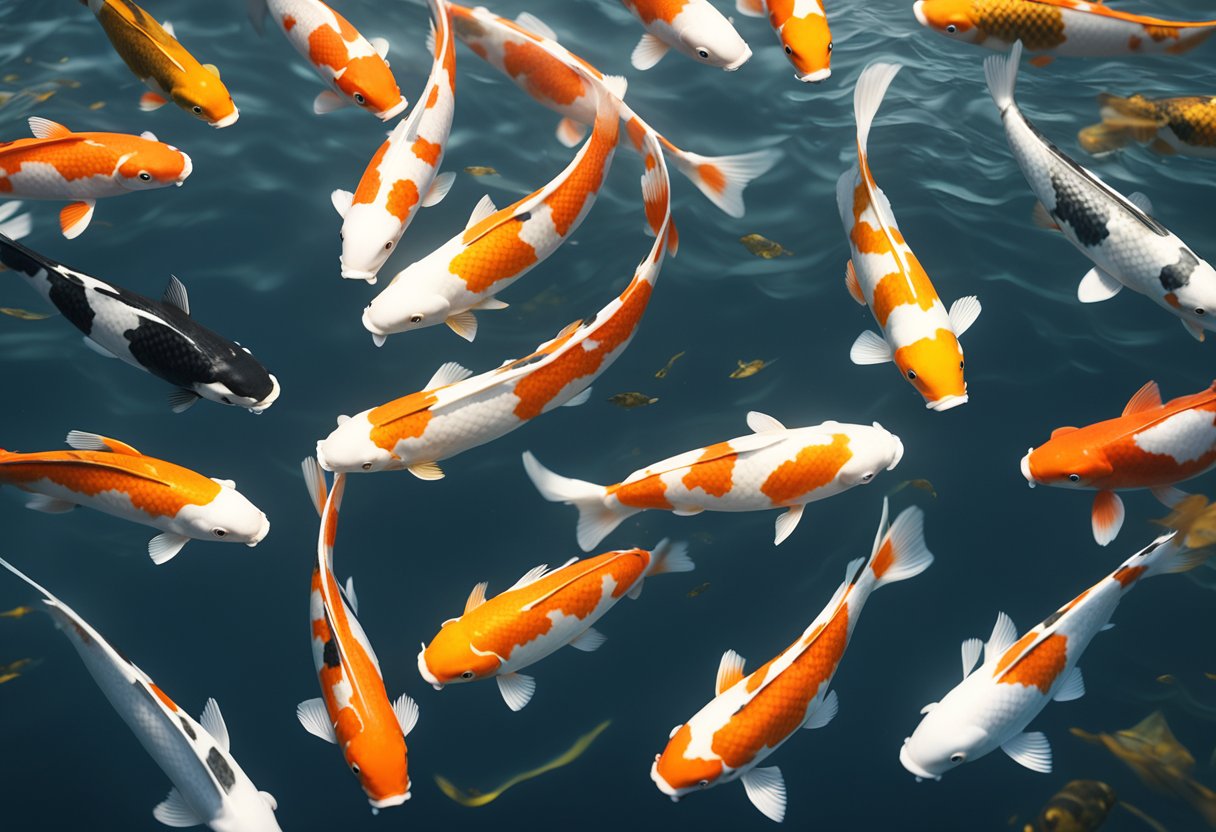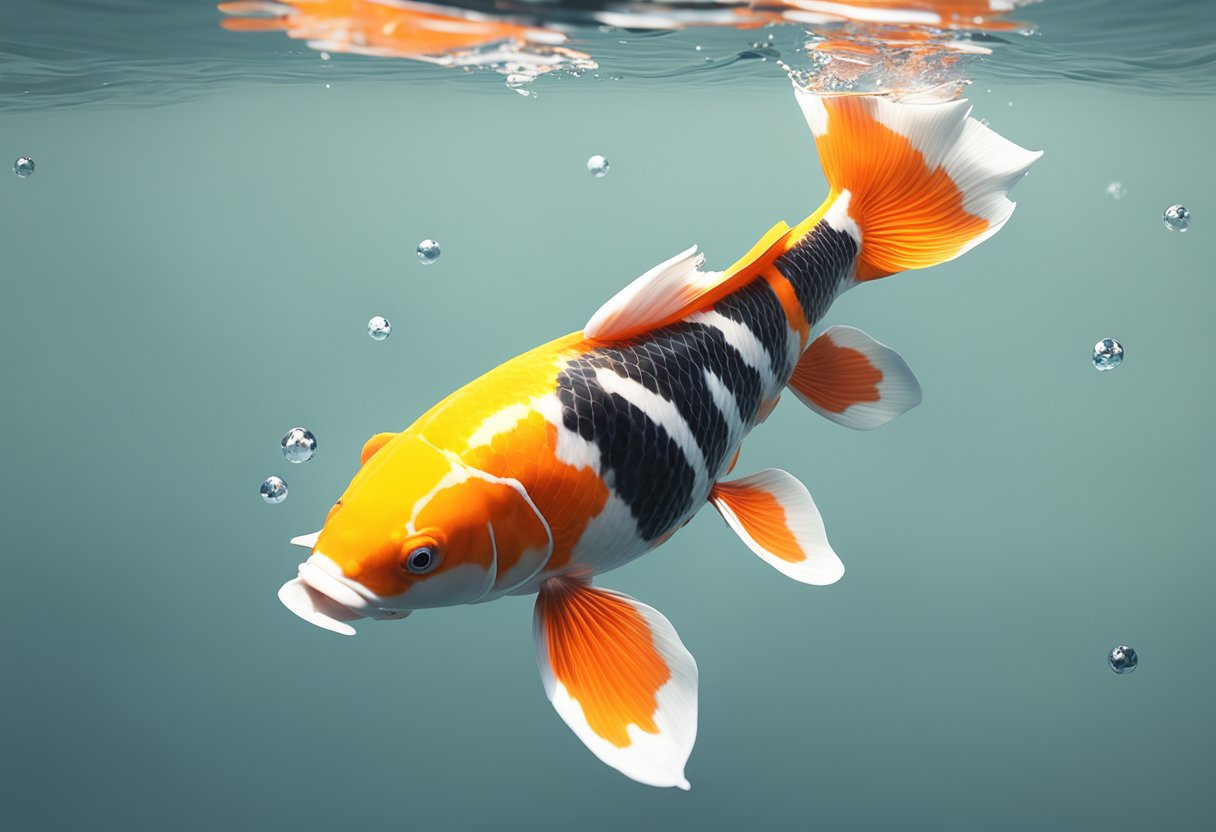Koi fish are a popular species of ornamental fish that are known for their vibrant colors and graceful swimming. However, like all living creatures, they are susceptible to stress. Stress in Koi fish can have serious consequences, including weakened immune systems, susceptibility to diseases, and even death. Therefore, it is important for Koi fish owners to be able to recognize the signs of stress and take appropriate action to address it.
One of the most common signs of stress in Koi fish is a loss of appetite. When a Koi fish is stressed, it may stop eating or eat very little. Other signs of stress include lethargy, hiding, and abnormal swimming behavior. In some cases, stressed Koi fish may also develop physical symptoms such as frayed fins or discoloration.
Addressing stress in Koi fish can involve a variety of measures. One of the first steps is to identify and eliminate any potential stressors in the fish’s environment, such as poor water quality or overcrowding. Other measures may include providing a more natural habitat, adding plants or hiding spots, and adjusting the fish’s diet. In some cases, medication may be necessary to treat underlying health conditions that are contributing to the fish’s stress.
Identifying Signs of Stress in Koi Fish

Koi fish are known for their vibrant colors and graceful swimming, but like all living creatures, they can experience stress. Identifying the signs of stress in Koi fish is essential for maintaining their health and well-being. Here are some common indicators of stress in Koi fish:
Behavioral Changes
One of the most noticeable signs of stress in Koi fish is changes in their behavior. They may become less active, spend more time hiding, or swim erratically. Some Koi fish may even become aggressive towards other fish in the pond. These behavioral changes can be a sign that something is wrong with the fish’s environment or health.
Physical Symptoms
Koi fish that are stressed may also exhibit physical symptoms. These can include a loss of color or vibrancy in their scales, frayed fins, or lesions on their skin. They may also develop ulcers or sores on their body, which can be a sign of a bacterial infection. It’s important to monitor your Koi fish regularly for any physical changes that may indicate stress.
Eating Patterns
Changes in eating patterns can also be a sign of stress in Koi fish. They may eat less or stop eating altogether, which can lead to weight loss and other health problems. On the other hand, some Koi fish may overeat when they are stressed, which can also be harmful to their health. Monitoring your Koi fish’s eating habits can help you identify any potential issues.
By keeping an eye out for these signs of stress in Koi fish, you can take steps to address any problems and keep your fish healthy and happy.
Common Stressors for Koi Fish

Koi fish are hardy and resilient creatures, but they are not immune to stress. Stress can be caused by a variety of factors, including poor water quality, overcrowding, and predator presence. In this section, we will explore these common stressors and how to address them.
Poor Water Quality
One of the most common stressors for koi fish is poor water quality. Koi fish require clean, well-oxygenated water to thrive. When the water quality is poor, it can lead to a range of health problems and stress.
The following are some signs of poor water quality in koi fish:
- Cloudy or murky water
- Algae growth
- Ammonia or nitrite spikes
- High or low pH levels
- Low oxygen levels
To address poor water quality, it is important to regularly test the water and make necessary adjustments. This may include adding beneficial bacteria, adjusting the pH levels, or increasing aeration.
Overcrowding
Another common stressor for koi fish is overcrowding. When koi fish are overcrowded, it can lead to aggressive behavior, poor water quality, and stress-related health problems.
The following are some signs of overcrowding in koi fish:
- Aggressive behavior
- Poor water quality
- Stunted growth
- Increased susceptibility to disease
To address overcrowding, it is important to ensure that there is enough space for each fish. A general rule of thumb is to provide at least 500 gallons of water per koi fish.
Predator Presence
Predator presence can also cause stress in koi fish. When koi fish feel threatened by predators, it can lead to a range of stress-related health problems.
The following are some signs of predator presence in koi fish:
- Hiding behavior
- Fins clamped to the body
- Loss of appetite
- Increased stress levels
To address predator presence, it is important to provide adequate protection for koi fish. This may include adding netting or fencing around the pond, or providing hiding places for the fish.
Preventative Measures for Stress
Koi fish are susceptible to stress, which can lead to a variety of health problems. To keep your fish healthy and happy, it is important to take preventative measures to reduce stress. Here are some tips:
Adequate Pond Maintenance
Keeping the pond clean and well-maintained is essential to the health of your fish. Regularly cleaning the pond and removing any debris, dead plants, or uneaten food can prevent the buildup of harmful bacteria and parasites. It is also important to maintain the proper water pH, temperature, and oxygen levels to ensure a healthy environment for your fish.
Proper Diet and Nutrition
Feeding your fish a balanced diet is crucial in preventing stress. Overfeeding can lead to digestive problems, while underfeeding can cause malnutrition and weaken the immune system. A balanced diet should include a mix of protein, carbohydrates, and vitamins. It is also important to avoid feeding your fish low-quality or spoiled food.
Stress-Free Environment
Creating a stress-free environment for your fish is key to preventing stress. This can be achieved by providing adequate hiding places, such as plants or rocks, to reduce aggression among fish. It is also important to avoid overcrowding the pond, which can cause competition for resources and lead to stress. Finally, minimizing exposure to loud noises and bright lights can also help reduce stress in your fish.
By following these preventative measures, you can help ensure the health and happiness of your Koi fish.
Treatment Strategies
When dealing with stressed Koi fish, there are several treatment strategies that can be employed to improve their condition. These strategies include water quality improvement, medical interventions, and stress reduction techniques.
Water Quality Improvement
One of the most important factors in maintaining the health of Koi fish is water quality. Poor water quality can cause stress and lead to a variety of health problems. To improve water quality, it is important to test the water regularly and make necessary adjustments. Some strategies for improving water quality include:
- Regular water changes
- Cleaning the pond or tank
- Adding beneficial bacteria to the water
- Adjusting pH levels
Medical Interventions
In some cases, medical interventions may be necessary to treat stress-related health problems in Koi fish. If the fish is showing signs of illness, it is important to consult with a veterinarian who specializes in aquatic animals. Some medical interventions that may be used to treat stress-related health problems include:
- Antibiotics
- Antifungal medications
- Anti-parasitic medications
Stress Reduction Techniques
Stress reduction techniques can also be effective in improving the health of stressed Koi fish. Some techniques that may be used to reduce stress include:
- Providing hiding places in the pond or tank
- Reducing noise and other disturbances
- Adding plants or other natural elements to the pond or tank
- Using calming agents, such as lavender oil
By employing these treatment strategies, Koi fish owners can help their fish recover from stress-related health problems and maintain their overall health and well-being.
Monitoring and Long-Term Care
To prevent stress in Koi fish, it is essential to monitor their behavior and environment regularly. Owners should check the fish’s appetite, swimming patterns, and coloration. If the fish are not eating, swimming erratically, or showing signs of discoloration, it could be an indication of stress.
Maintaining water quality is crucial for the long-term health of Koi fish. Owners should regularly test the water parameters, including pH, ammonia, nitrite, and nitrate levels. Any fluctuations in these levels can cause stress to the fish. Owners should also ensure that the water is adequately oxygenated and free from any toxins or pollutants.
To reduce stress levels, owners should provide a stress-free environment for their Koi fish. This includes ensuring that the water temperature is consistent and suitable for the fish’s needs. Owners should also provide adequate hiding places and shelter for the fish, such as rocks, plants, and caves.
In addition to monitoring the fish’s behavior and environment, owners should also provide long-term care to prevent stress. This includes a balanced diet, regular exercise, and proper medical care. Owners should also avoid overcrowding the tank or pond, as this can cause stress to the fish.
By monitoring the fish’s behavior and environment regularly and providing long-term care, owners can prevent stress in their Koi fish and ensure their long-term health and well-being.

As a dedicated veterinarian and animal enthusiast, I, Phoebe Wright, bring a unique perspective to my writing about Koi Fish. With my expertise in animal care, I strive to share valuable insights in a friendly and approachable manner, making my posts both informative and enjoyable to read.







